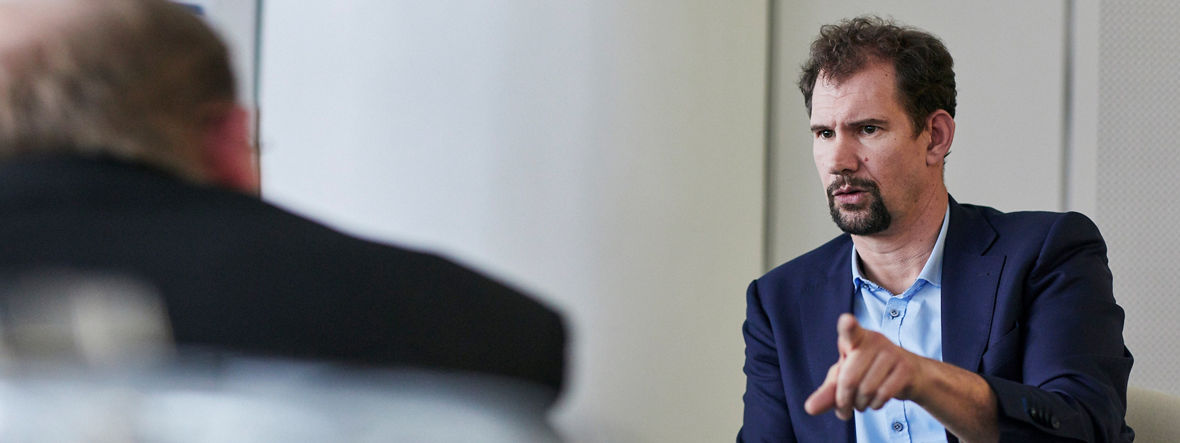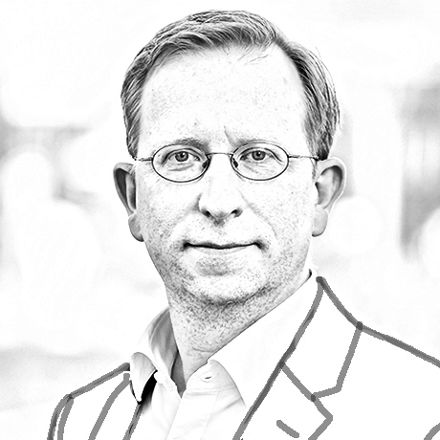Mr. Monsees, you are responsible for digitalization at BMW. What does digitalization mean for the auto industry?
At the moment, the connection between digitalization and the auto industry is often discussed in negative terms. People talk about the risks digitalization poses to jobs and employment and the alleged danger of German automakers being robbed of their business. That’s how the situation looks to outsiders, but not to us. By contrast, we believe that digitalization offers our industry huge potential and gigantic opportunities.
What kinds of opportunities?
Our mission is to create added value for our customers. After all, we’re not pursuing digitalization for its own sake. We’re looking for benefits and added value for our customers. If we successfully deliver that to our customers, digitalization will offer us new areas of business.
Can you give us an example?
The traditional product development process works as follows: We do research and development, and through it we create new products. This is followed by marketing and sales models, and finally we expect customers to buy the product. That’s how it used to be, everything very linear. Today, thanks to data analytics and the Internet of Things, we have the ability to understand what customers really need and want at a much earlier point in time. We’re not the ones who try to figure out what our customers might reasonably need. Instead, data-supported analyses and artificial intelligence offer us the basis for better understanding customer needs. On this basis we can develop our products and services, deriving them directly from the customer. This means a paradigm shift, completely different processes, and a different mentality.
The further development of cars seems to be increasingly driven by software. Modern cars drive and park themselves almost independently, continuously communicate gigantic amounts of data, and almost seem to be computers on wheels. Doesn’t that cause you some concern?
In the area of digitalization we are focusing on the opportunities rather than on concerns and misgivings. We believe that the privacy and safety of our customers are especially important. Why should this development be causing me concern?

»We’re not pursuing digitalization for its own sake. We’re looking for added value for our customers«
JENS MONSEES
Well, online commerce on the Internet is a threat to the very existence of many traditional retailers. The business models of banks and insurance companies are also changing. And according to some gloomy scenarios for the auto industry, the automakers will one day be degraded to the status of suppliers for the software corporations.
I don’t share this fear, but the idea behind it has to be taken seriously. When I get into my car today, I take along my Spotify and all of my digital services. They come from other suppliers, not directly from BMW. If we put our main focus on the customer, all of these elements have to be compatible and they have to function smoothly.
And what happens if you don’t?
If many companies are competing over a single customer, a third party might come along later on from Silicon Valley or China and say, if you don’t close these gaps and don’t offer a really customer- friendly product, we’re going to take away your business. That has already happened in the travel industry and in commerce.
How do you plan to prevent this from happening in the auto industry?
First of all, by reorganizing our entire business from the standpoint of the customer. And secondly, by abandoning the idea that we can develop the best customer solution for every need inside our own company. We are concluding partnerships and working together to bake a big beautiful cake for the customers, which will then belong to several companies.v
So you’ll be sharing the customers and sharing the business. Will this strategy still enable you to grow?
All of us will grow together.
Or will these partnerships ultimately mean that less of the big automotive cake will be left over for you?
No, we’ll be getting more. Absolutely. After all, the cake is getting bigger all the time.
And how will it be distributed? In the future, how will you decide what you will do yourself and where you’ll have to depend on partnerships?
We have to fill the interface to the customer with innovative and digital services ourselves. We have to do this better and integrate it more deeply than companies like Google and Apple. That’s the way to do it. At my former employer, Google, Larry Page always called this the toothbrush test. Everybody needs a toothbrush and uses it twice a day. If I invent a product or a service that helps to fill a need in a similar way, it will be possible to monetize it.

And are we able to do that in Germany?
Are we? Absolutely! Germany is a country of engineers.
But the best software engineers are obviously located elsewhere.
I worked at Google for seven years, and I assure you that they can’t work miracles. However, there is a crucial cultural difference. When an engineer in Germany achieves a 98 percent solution for a problem, he talks about the two percent that is still missing. When an American achieves a 60 percent solution, he calls it awesome, great, and wonderful.
What can we learn from that?
I think we should work with much more self-confidence and really think in terms of opportunities. From my experiences in the USA, I know that Google and Amazon are also copying many aspects of German industrial companies—for example, our absolute process orientation and our almost perfectionistic attention to detail. And planning things, very complicated things, very well.
»Germany should be much more self-confident and really think in terms of opportunities — after all, we are a country of engineers«
JENS MONSEES
At the same time, Americans joke a little about German “overengineering.”
If it’s really a case of overengineering, that’s not good. But just take a look at a logistics center at Amazon. They are also striving for efficiency, precision, and the smooth interaction of huge gear trains. I think that the IT industry is learning a lot from the German production industry.
Is that what we mean by Industry 4.0?
Exactly. And from my point of view, this theme is really being defined by Europeans and Germans. On the other hand, of course at companies like Apple we also have the flexible approach, agile working, and the absolute orientation toward customer utility. All of these are good things, and they are now being adopted very quickly by the automobile industry in order to fill its own gaps.
If it’s true that we know and can do all of these things, why is it that all of the globally successful companies such as Google, Amazon, and Facebook come from the USA and not from Germany?
I’ve been thinking about that question for a long time. I think one of the reasons is that the USA and also China, where these huge ecosystems have arisen and where the very successful companies have grown up, have gigantic domestic markets. As a result, they can start out by conquering their domestic markets without entering into big partnerships or being adapted for other cultures and languages. In this way they already grow to be very big before they go out into the world. One example of that is the online retailer Alibaba from China, which is now coming to Europe and the USA.
The German market is rather small compared to the USA and China…
…and that’s why we can’t monolithically develop things such as autonomous driving for ourselves alone and simply build them digitally. That being the case, why can’t we build a platform together with other manufacturers and develop this area together?
Even beyond Germany?
Take Airbus as an example, in competition with Boeing. In that case the Europeans didn’t talk about the individual pieces of the cake. Instead, they worked together to build up something big. Through collaboration across national boundaries, they reached critical mass.
In the auto industry you are now trying to reach critical mass together with Mercedes and Audi.
…in order to accumulate enough data. Digital systems are always critical masses: The more people are in the system and the more they use my services, the better can I individualize them and the more I learn about these people’s needs. Nowadays that’s called an ecosystem. I have to create a center of gravity that might not lie entirely within my own industry. It can also be a neutral area in the middle, around which the auto industry will then grow.
In the end, the vehicles, which used to be your core products, will be interchangeable.
The BMW Group always promises to deliver a premium product. That’s why at BMW the steering wheel will also stay on board, and along with it the driving pleasure. At the same time, we want to use differentiated driving strategies to give our customers the option of participating in a video conference during a drive instead of driving themselves. In the end, digitalization primarily offers customers many new opportunities.




